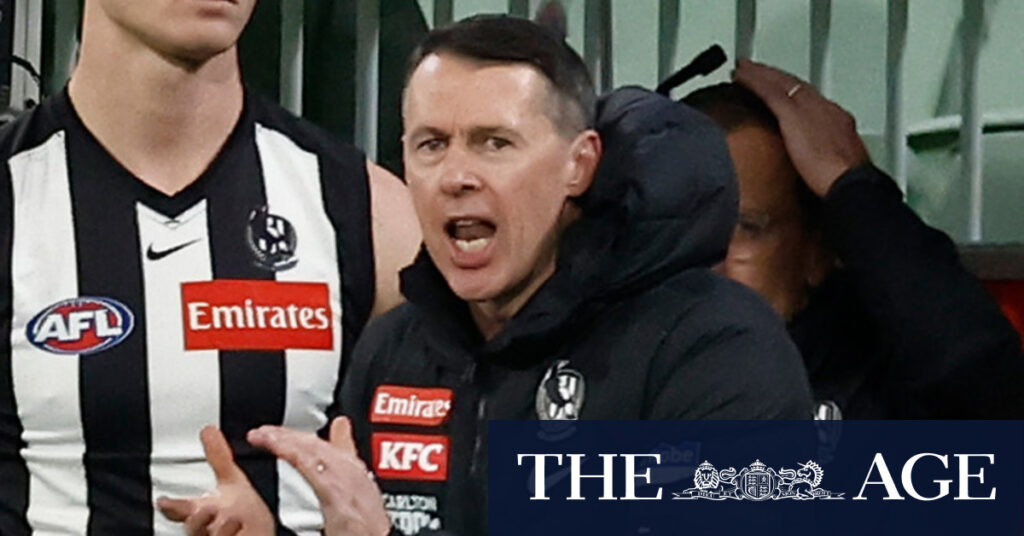
Craig McRae, the coach of Collingwood’s Magpies, recently criticized his team’s lack of effort, raising questions about whether their struggles are deeper than mere exertion. The once formidable team, known for their adeptness at “managing the minutes” in tight games, now appears to be grappling with maintaining player performance throughout the season. This shift in focus became evident after they secured their 14th win, seemingly ensuring their spot in the finals.
Nick Daicos, one of the Magpies’ key players, was unexpectedly benched against Hawthorn, sparking speculation about the team’s strategy. The decision to start Daicos on the bench was seen as a tactical move, possibly to manage his minutes, a strategy McRae has defended as necessary for all players, even the leaders. Yet, this approach has not been without its critics.
Strategic Adjustments and Player Management
The Magpies’ recent performance downturn began with a loss to Gold Coast, where veteran Scott Pendlebury started as a substitute. His entry into the game altered its dynamics, but not enough to secure a win. Similarly, the management of Jordan De Goey and Bobby Hill’s playing time in their loss to the Brisbane Lions highlighted the challenges of reintegrating players post-injury or illness.
Injuries have compounded these issues, with Beau McCreery and Jeremy Howe sidelined, exposing a lack of depth in the squad. Collingwood has utilized just 35 players this season, the fewest since 2011, putting pressure on core players who are both out of form and facing contract uncertainties. This has limited opportunities for emerging talents like Wil Parker and Ed Allan, reducing competitive pressure on established players.
Implications of Tactical Decisions
McRae’s post-match comments about the team being too focused on outcomes rather than immediate gameplay reflect a broader strategic tension. Every decision in the past month seems outcome-driven, yet McRae insists on the importance of moment-to-moment focus. The Magpies’ next game against the Crows is critical; a win is essential to gain momentum heading into the finals.
Meanwhile, the Brisbane Lions’ recent loss to Sydney at their Gabba home marks their fourth defeat in eight games there, jeopardizing their hopes of hosting a qualifying final. Despite injuries to key players like Lachie Neale and defensive stalwarts, the Lions remain contenders. Their challenging schedule, having faced top-nine teams 11 times, underscores the competitive landscape of this season.
Broader AFL Context
As the season progresses, the distorted fixture’s impact on the ladder is becoming more pronounced. The Lions, for instance, have one of the toughest draws, facing top teams repeatedly, which could influence their finals prospects. This season might require 15 wins just to secure a finals spot, highlighting the intense competition and strategic calculations teams must navigate.
In another notable development, the Bulldogs’ Sam Darcy has emerged as a pivotal player, contributing significantly to his team’s finals contention. His performance against the Demons, including a crucial mark in the final minute, exemplifies the high stakes and dramatic turns typical of this AFL season.
Legal and Ethical Considerations in AFL
Dylan Shiel’s tribunal case introduces a new dimension to player conduct discussions. The AFL match review officer has emphasized the duty of care players owe to all on the field, not just opponents. Shiel’s case, involving a push that inadvertently led to a teammate’s injury, could set a precedent for future conduct evaluations.
As the AFL grapples with these complex issues, the implications extend beyond individual cases. The duty of care principle, if broadened, could affect how other on-field incidents, such as bumps, are judged. This evolving legal landscape adds another layer of complexity to an already challenging season.
As the finals approach, teams like Collingwood and the Lions must navigate these strategic, competitive, and ethical challenges. The outcomes of their decisions will not only shape their immediate fortunes but could also influence broader AFL policies and practices in the years to come.




